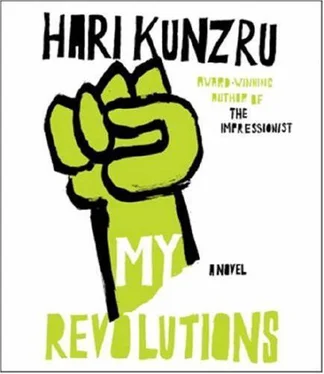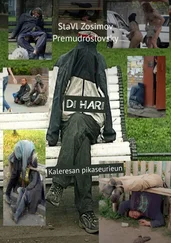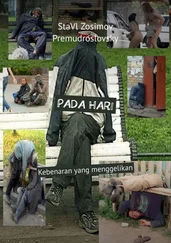Was that before or after Anna went to Paris? I’m honestly not sure. Maybe it’s the stress we were living under or maybe it’s just too long ago, but that year exists for me only as a series of fragments, shards of memory I can’t fit together and don’t quite trust. I know my mind is capable of playing tricks, not just in sequencing but in deeper, more subtle ways. For example, I remember daffodils in the graveyard where I walked with Anna, looking for dead babies.
It was a little Norman church with a lychgate and moss-covered gravestones leaning at drunken angles. The light of my memory is golden-hour light, warm and diffuse. Sunshine-yellow daffodils are scattered in the long grass. Sunshine-yellow and paper-white. But that would place it in early spring, and it was certainly later than that, months later.
I remember, very clearly it seems to me, what she looked like and how she was dressed. Her hair was cropped short, her arms and legs bare. There was a softness about her body that I associate with periods when she was happy, when she allowed herself to be less rigorous and austere. We were laughing, strolling through the churchyard like conventionalized lovers, bathed in the yellow light that’s now eternally the light of i97i, not just for me but for everyone who saw a film or looked at a magazine that year. Dazzle and softness and lens flare.
We held hands. I can’t have concocted that. She talked about her childhood. For most children, the world is defined by the sensory; by likes and dislikes, favorite smells and tastes. Anna’s narrative was mostly about ideas. Witness, duty. It’s the only time I remember hearing her speak about her family. She was an only child, precocious and diligent, the repository of all her Quaker parents’ wishes for the future. She didn’t say much about her mother, but spoke of her father with respect and what sounded like regret. He’d been, she said, like an exam board, asking her general knowledge questions at the dinner table, testing her on her memory for various prayers and catechisms. She recited for me, in an ironic sing-song voice: We utterly deny all outward wars and strife, and fightings with outward weapons, for any end or under any pretense whatever; this is our testimony to the whole world.
“He knows someone has to fight,” she told me. “That’s what makes him unforgivable. He’s just too finicky to do it himself.”
Later, I saw a picture of her father, a gaunt man in an old-fashioned woollen waistcoat, staring defiantly at the camera as he defended his dead terrorist daughter to a magazine journalist. He’d taken her on demonstrations, taught her that it was sometimes
necessary to exercise dissent if one wanted to have a conscience void of offense toward God and toward men. The journalist described him as a religious zealot.
Anna remembered playing at the back of meeting halls during lectures, whispering to her doll. She looked so lonely, as she told me that; I reached for her instinctively. I was hurt when she started to speak to me in the jargon of Criticism-Self-Criticism, reproaching me for allowing myself to get distracted. “What about pleasure?” I asked, trying to sound sarcastic. She told me flatly that our pleasure wasn’t relevant to the struggle. It was only through the struggle that we could materialize ourselves in a meaningful way. If I wanted to fuck, she said, we could fuck; but politically she was sick of fucking.
I was so angry that I couldn’t speak. Was that what she thought? That I only wanted to fuck? She walked a few feet away, looking down at the line of headstones.
“Here’s one,” she said.
And there it was, in gold letters on a little white marble slab.
MICHAEL DAVID FRAME
4.10.48–1.12.50
“RESTING WHERE NO SHADOWS FALL”
“That could do for you.” She got out a notebook and started taking down the details.
In the car on the way back to London she told me, almost casually, that she’d been approached, through one of her Paris friends, by the Popular Front for the Liberation of Palestine. The PFLP had offered us funds and training. She was going to Paris to meet one of their representatives.
I was stunned. Why hadn’t I been told? This was the most important news imaginable and she hadn’t even discussed it with the rest of us before agreeing to a meeting. There were a thousand political questions. There were security issues. I started to argue with her but she brought me up short by telling me that the others
had already agreed. She and Sean had discussed it in some detail, she said. Sean thought it was the right move. Leo and Jay were in agreement too.
“The revolutionary is a doomed man,” wrote Nechayev. “He has no interests of his own, no affairs, no feelings, no belongings, not even a name.” The monks at Wat Tham Nok would recognize that, I think. If to be a revolutionary is to be nameless, without attachments, then a revolutionary is simply a person who has understood the first three of the Four Noble Truths of Buddhism. He sees suffering, sees that its cause lies in greed and craving; he also sees that it could potentially come to an end. But what’s the right way to end suffering? The revolution, giving yourself up to history? Or Nibbana, giving yourself up to transcendence? Phra Anan, whose English was good enough to discuss such things with me, had no time for history. “Too much history in Indochina,” he’d say, shaking his stubbly head. “Less history needed, not more.”
After so long living as Mike Frame, it’s sometimes hard to find my way back to Chris Carver, to remember why he made the choices he did. There seems such an obvious split between how I wanted things to be and how they actually were, not just in the world but in our group, our little cell. We were supposed to be a band of equals, committed to abolishing every trace of power in our relationships with one another. But once Anna and Sean started taking decisions on their own, that was self-evidently no longer true. I was twenty-three by then. Not so young. Old enough to know that taking your desires for reality wasn’t a straightforward answer to anything.
With the benefit of hindsight, it’s easy to see that Anna and Sean had always been in front, daring one another to go further out onto the ledge. In a way it seems extraordinary that they took so long to fuse together, to start acting in concert. When they did, they ran the rest of us off our feet. The PFLP contact was the first incontrovertible sign that I was no longer in control of my life. I should have seen I was heading into the darkness. I should have gotten off the bus.
At the time I got bogged down in detail. I knew very little about the Middle East and, unlike a lot of my friends, I had an instinctive sympathy with the Israelis. After the concentration camps, who could deny them a home? On the other hand, the cruelties inflicted on the Palestinians were undeniable. Anna poured scorn on my confusion. The PFLP were Marxist-Leninists. They were fighting Imperialism. That should be enough. It wasn’t necessary to get into the intricacies of their political position, or to agree with everything they did. It would be a pragmatic alliance. Their contact in Paris would pay us three thousand U.S. dollars a month, which would solve our money worries at a stroke. Our people could go out to Lebanon and receive proper weapons and explosives training. We’d become an effective fighting force. What was there to discuss?
So Anna disappeared to Paris and stayed away for weeks. Sean organized his disastrous bank raid. I sent off for a birth certificate in the name of Michael Frame and used it to apply for a passport. We were all doing the same thing, developing aliases, preparing to go underground.
* * *
Finally I turn off the main road and start to pick my way up the pass toward Sainte-Anne-de-la-Garrigue. It’s after midnight and the petrol gauge has dipped into the red. I drive very slowly; my tired eyes are producing phantoms, shadows that race across the road and flicker in the rearview mirror.
Читать дальше












